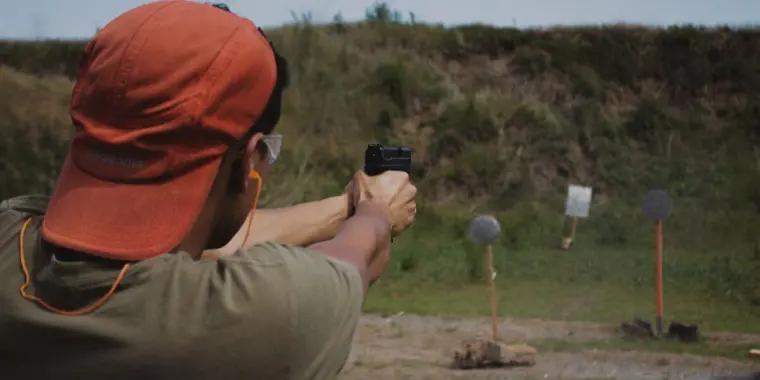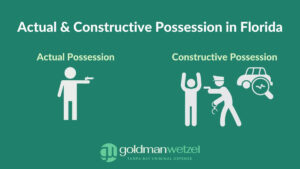Get a Free Consultation
Call Us - Available 24/7
 (727) 828-3900
(727) 828-3900 
A felony conviction can result in long periods of imprisonment and hefty fines. But, even after they served their time, felons must face additional restrictions, such as losing their right to own a gun. If you were convicted of a felony and found in possession or control of a weapon, you could face a charge for felon in possession of a firearm in Florida.
Possession of a firearm by a convicted felon is a severe offense that is punishable by incarceration and hefty fines. As a result, if you are facing accusations for this crime, you should seek legal advice. Call 727-828-3900 to book a free consultation with a Tampa Bay criminal defense attorney from Goldman Wetzel.
According to Florida Statute § 790.23, felons are not allowed to possess or control any firearm, ammunition, or electric weapon. This statute also establishes that a convicted felon is prohibited from carrying a concealed weapon, including chemical weapons or devices such as tear gas guns.
In Florida, a convicted felon is a person found guilty of a criminal offense punishable by more than one year of imprisonment. People convicted of a felony in another jurisdiction that transgress these laws may be charged with felon in possession of a firearm in Florida.
In addition to guns, examples of devices that felons are not allowed to have include but are not limited to:
When it comes to possession of a firearm by a convicted felon, it is important to understand the difference between actual and constructive possession.

Actual possession of a firearm occurs when the person has physical control over the gun. Having a gun in your hand or person is an example of actual possession. On the contrary, constructive possession exists when the gun is a place over which the felon has control.
To put it simply, with constructive possession, law enforcement can reasonably assume that you knew where the gun was and you could access it. However, proximity alone is not enough to prove that a person was in control of the firearm.
For instance, in Watson v. State, the defendant appealed his conviction for possession of a firearm or ammunition by a convicted felon. At the moment of his arrest, law enforcement found:
Because the guns were not on his person and the car was a rental, the defendant was considered to be in constructive possession. In other words, the prosecution had to prove that Watson knew about these items and was able to exercise control over them.
Given that the State could not provide enough evidence to tie the defendant to the guns and ammunition, his conviction for possession of a firearm or ammunition by a convicted felon was reversed.
Being charged with illegal possession of a gun does not mean you have been found guilty of a crime. An experienced criminal defense attorney can evaluate the facts of your case to determine the most suitable defense for you. If you are looking for a criminal lawyer near Tampa Bay, contact Goldman Wetzel to book a free consultation.
In Florida, possession of a firearm by a convicted felon is a second-degree felony, and it is punishable by up to 15 years of imprisonment and a fine of up to $10,000. There is a three-year minimum mandatory sentence for felons who were found in actual possession of a firearm.
However, if the prior conviction or this current offense were committed to benefit or promote a criminal gang, charges will be enhanced to a first-degree felony. In this case, the punishment should not exceed life imprisonment and a $10,000 fine.
Possession of a firearm by a convicted felon is an offense guarded by federal legislation. In other words, like in Florida, federal law also regulates firearm possession. 18 U.S.C. 922(g)(1) establishes that felons are prohibited from possessing any firearms or ammunition.
Under federal legislation, a felon is a person who has been convicted in any court for a crime punishable by more than one year of imprisonment. In addition to felons, this legislation also prohibits people convicted for domestic violence from owning a gun.
The punishments for a 922(g)(1) charge include up to 10 years in a federal prison. However, defendants with three prior convictions for a violent felony or a serious drug offense must serve a minimum of 15 years imprisonment.
Federal crimes are treated more harshly than state charges. In fact, according to a report provided by the United States Sentencing Commission, 96.9% of felons in possession of a firearm were sentenced to prison.
If a federal law enforcement agency arrested you, you should seek legal counsel as soon as possible.
Felon in possession of a firearm in Florida is a serious charge with harsh punishments. Having prompt legal representation can improve your chances of a successful outcome. If you are looking for a criminal defense attorney near the Tampa Bay area, we may be able to help.
The criminal defense lawyers at Goldman Wetzel represent clients facing criminal charges in state and federal court. If you want to explore the potential legal avenues for your case, contact us today to book a free consultation.